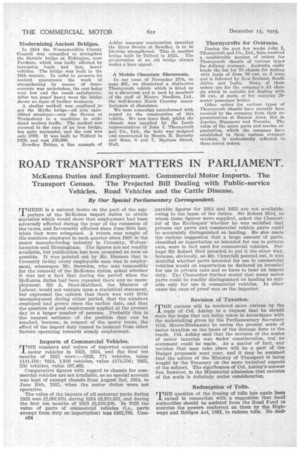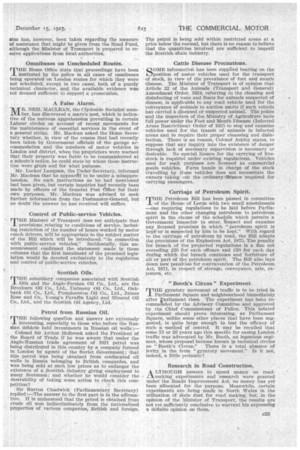ROAD TRANSPORT MATTERS IN PARLIAMENT.
Page 8

Page 9

If you've noticed an error in this article please click here to report it so we can fix it.
McKenna Duties and Employment. Commercial Motor Imports. The Transport Census. The Projected Bill Dealing with Public-service Vehicles. Road Vehicles and the Cattle Disease.
By Our Special Parliamentary Correspondent.
THERE is a natural desire on the part of the supporters of the McKenna import duties to obtain statistics which would show that employment had been adversely affected during the year of the remission of the taxes, and favourably affected since June 30th last, when they were reimposed. A return was sought of the numbers employed in each quarter since 1920 in the motor manufacturing industry in Coventry, Wolverhampton and Birmingham. The figures are not readily available, but publication has been promised as soon as possible. It was pointed out by Mr. Hannon that in Coventry to-day every employable man was in employment, whereupon Mr. Snowden, who was responsible for the removal of the McKenna duties, asked whether It was not a fact that during the period when the McKenna duties had been repealed there was no unemployment. Sir A. Steel-Maitland, the Minister of Labour, would not venture upon a statistical statement, but expressed the opinion that there was very little unemployment during either period, that the numbers employed had grown since the earlier date, and that the question of good employment applied at the present day to a larger number of persons. Probably this is the nearest estimate of the position that can be reached, because, in respect of the motor trade, the effect of the import duty cannot be isolated from other factors operating towards steady employment.
Imports of Commercial Vehicles.
THE numbers and values of imported commercial motor vehicles in 1923, 1924, and the first ten months of 1925 were :-1923, 771 vehicles, value £141,419; 1924, 1,319 vehicles, value £174,550; 1925, 559 vehicles, value 197,462.
Comparative figures with regard to chassis for commercial vehicles are not available, as no special account was kept of exempt chassis from August 2nd, 1924, to June 30th, 1925, when the motor duties were not operative.
The value of the imports of all motorcar parts during 1923 was £2,097,670, during 1924 13,371,051, and during the first ten months of 1925 £2,376,208. In 1923 the value of parts of commercial vehicles (i.e., parts exempt from duty on importation) was £462,796, Corn parable figures for 1924 and 1925 are not available. owing to the lapse of the duties. Sir Robert Bird, to whom these figures were supplied, asked the Chancellor of the Exchequer whether he was satisfied that private car parts and commercial vehicle parts could be accurately distinguished on landing. He also made the curious suggestion that a large amount of parts, classified on importation as intended for use in private cars, were in fact used for commercial vehicles. Perhaps Sir Robert Bird intended to put it the other way, because, obviously, as Mr. Churchill pointed out, it was doubtful whether parts intended for use in commercial vehicles would on importation be declared as intended for use in private cars and so have to bear an import duty. Th,3 Chancellor further stated that many motor parts could be readily distinguished on landing as suitable only for Use in commercial vehicles. In other cases the onus of proof was on the importer.
Revision of Taxation.
THE curious will be rendered more curious by the reply of Col. Ashley to a request that he should state the steps that are being taken in accordance with the undertaking given by the Parliamentary Secretary (Col. Moore-Brahazon) to revise the present scale of motor taxation on the basis of the damage done to the roads. Col. Ashley said that the revision of the scales of motor taxation was tinder consideration, but no statement could be made. As a matter of fact, any revision that may take place will be a part of the Budget proposals next year, and it may be assumed that the advice of the Ministry of Transport is being sought by the Treasury on the more technical aspects of the subject. The significance of Col. Ashley's answer lies, however, in the Ministerial admission that revision of the scale is definitely under consideration.
Redemption of Tolls.
THE question of the freeing of tolls has again been raised in connection with a suggestion that local authorities should be assisted from the Road Fund to exercise the powers conferred on them by the Highways and Bridges Act, 1891, to redeem tolls. No ded.
Sion has, however, been taken regarding the measure of assistance that might be given from the Road Fund, although the Minister of Transport is prepared to receive applications from local authorities. '
Omnibuses on Unscheduled Routes.
THE Home Office state that proceedings have been instituted by the police in all cases of omnibuses being operated on London routes for which they were not scheduled, except in two cases, both of a purely technical character, and the available evidence was not deemed sufficient to support a prosecution.
A False Alarm. A False Alarm. mR. NEIL MACLEAN, the Clydeside Socialist member, has discovered a mare's nest, which is indicative of the nervous apprehension prevailing in certain Labour circles on account of recent movements for the maintenance of essential services in the event of a general strike. Mr. Maclean asked the Home Secretary whether, in view of the census that had recently been taken by Government officials of the garage accommodation and the numbers of motor vehicles in London and district, when the proprietors were warned that their property was liable to be commandeered at a minute's notice, he could state by whom those instruction were given and for what purpose.
Mr. Locker Lampson, the Under-Secretary, informed Mr. Maclean that he appear&I to be under a misapprehension. No sueh instructions as he had mentioned had been given, but certain inquiries had recently been made by officers of the General Post Office for their own purposes. Mr. Maclean was advised to seek further information from the Postmaster-General, but no doubt the answer he has received will suffice.
Control of Public-service Vehicles.
THE Minister of Transport does not anticipate that provisions relating to conditions of service, including restriction of the number of hours worked by motor coach drivers, will be appropriate to the subject matter of the Bill which will be introduced "in cennection with public-service vehicles." Incidentally, this announcement confirmed the statement made in these columns that the first instalment of the promised legislation would be devoted exclusively to the regulation and control of public-service vehicles.
Scottish Oils.
THE subsidiary companies associated with Scottish
Oils and the Anglo-Persian Oil Co., Ltd., are the Broxburn Oil Co., Ltd., Dalmeny Oil Co., Ltd., Oakbank Oil Co„ Ltd., Pumpherston Oil Co., Ltd., James Rose and Co., Young's Paraffin Light and Mineral Oil Co., Ltd., and the Scottish Oil Agency, Ltd.
Petrol from Russian Oil.
TAE following question and answer are extremely interesting, especially to those who before the Russian d6bacle held investments in Russian oil wells :—
Colonel Sir Arthur Holbrook asked the President of the Board of Trade if lie was aware that under the Anglo-Russian trade agreement of 1021. petrol was being distributed in this country by a company formed in London by agents of the Soviet Government; that this petrol was being obtained from confiscated oil wells in Russia belonging to British companies, and was being sold at such low prices as to endanger the existence of a Scottish industry giving employment to many Scotsmen ; and whether he would consider the desirability of taking some action to check this competition?
Sir Burton Chadwick (Parliamentary Secretary) replied :—The answer to the first part is in the affirmative. If is understood that the petrol is obtained from crude oil won indiscriminately from the nationalized properties of various companies, British and foreign. The petrol is being sold within restricted areas at a price below the normal, but there is no reason to believe that the quantities involved are sufficient to imperil the Scottish shale industry.
Cattle Disease Precautions.
• COME information has been supplied bearing on the kiposition of motor vehicles used for the transport of stock, in view of the prevalence of foot and mouth disease. The Minister of Transport is of opinion that Article 22 of the Animals (Transport and General) Amendment Order, 1924, referring to the cleaning and disinfecting of vans and floats for animals suspected of disease, is applicable to any road vehicle used for the conveyance of animals to auction marts if such vehicle has carried a diseased or suspected animal. The police and the inspectors of -the Ministry of Agriculture have full power under the Foot and Mouth Disease (Infected Areas Restrictions) Order of 1925 to stop and examine vehicles used for the transit of animals in infected areas and to require their proper cleansing and disinfection. There is no reason, Colonel Ashley states, to suppose that any inquiry into the existence of danger through lack of necessary supervision is necessary or desirable. No special licence for the carrying of livestock is required under existing regulations. Vehicles used for such purposes are licensed as commercial goods vehicles. Farm hands in charge of the stock travelling by these vehicles does not necessitate the owners taking out the ordinary:',-fiCence required for carrying passengers.
Carriage of Petroleum Spirit. Carriage of Petroleum Spirit. THE Petroleum Bill has been passed in committee of the House of Lords with two small amendments —one requiring regulations to be laid before Parliament and the other changing petroleum to petroleum spirit in the clause of the schedule which permits a Government inspector to enter, Inspect and examine any licensed premises in which "petroleum spirit is kept or is suspected by him to be kept." With regard to the carriage of petroleum by road, the Bill adapts the provisions of the Explosives Act, 1875. The penalty for breach of the projected regulations is a fine not exceeding £20 for each offence and £10 for each day during which the breach continues and forfeiture of
• all or part of the petroleum spirit. The Bill also lays down new penalties for contravention of the Petroleum Act, 1871, in respect of storage, conveyance, sale, exposure, etc.
"Booth's Circus" Experiment.
THE gyratory movement of traffic is to be tried in Parliament Square and neighbourhood immediately after Earliaraent rises. The experiment has beea recommended by. the Advisory Committee and approved by the Chief Commissioner of Police. This belated experiment should prove interesting, as Parliament Square, unlike some other places that have been suggested, is quite large enough to test the efficacy of such a 'method of control, it may be recalled that some 15 or 20 years ago this specific for easing London traffic was advocated by Mr. Booth, an ingenious engineer, whose proposal became known in technical circles
as "Booth's Circus." There is a total absence of levity in the term "gyratory movement." Is it not, indeed, a little pedantic?
Research in Road Construction.
ALTHOUGH powers to spend money on roadmaking experiments and research were granted under the Roads Improvement Act, no money has yet been allocated for the purpose. Meanwhile, certain experiments are being made in North Wales in the utilization of slate dust for road making, hut, in the opinion of the Minister of Transport, the results are not yet sufficiently conclusive to warrant his expressing a definite opinion on them.




























